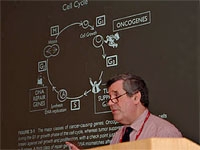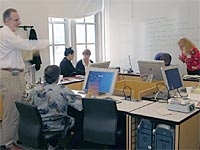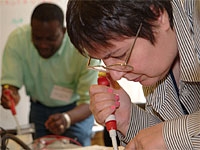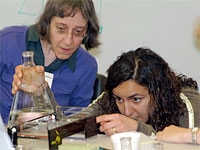
Dr. Fred Gilbert, associate professor of pediatrics, lectures teachers on genetic disease and the ethical dilemmas faced by physicians.
On May 10, the Office of Fellowships and Outreach of Weill Graduate School of Medical Sciences (WGSMS), in collaboration with the Cornell Institute for Biology Teachers (CIBT), held a workshop for 25 New York City high school biology teachers at Weill Cornell. The teachers willingly gave up a full day to learn about human genetics, ethics and the use of DNA in the courtroom.

Dr. Joel Pardee, associate dean of the Graduate School of Medial Sciences, facilitates a workshop on ethics with teachers.
During the day, the teachers attended two lectures. In the first, Dr. Fred Gilbert, associate professor of pediatrics at Weill Cornell, gave an informative talk on human genetics, emphasizing the heritable forms of cancer, such as retinoblastoma, and highlighting some of the ethical dilemmas faced by clinicians when treating patients and their families. Dr. Joel Pardee, associate dean at WGSMS, gave the second lecture on ethics. Dr. Pardee then facilitated a "Problem-Based Learning" discussion amongst the teachers on the ethical dilemmas raised by human cloning. A lively discussion ensued with many teachers commenting that the PBL technique would be very useful in their own teaching environments.

Teachers load DNA into the agarose gel.
The teachers also participated in two laboratory workshops, a DNA profiling lab and a human karyotyping lab. Both of these labs were taught by graduate student volunteers: Andrea Brenner; Michael Bruno; Deirdre McGarrigle; Jale Refik-Rogers; Jeremy Seto; and Wappinger's Falls High School teacher, Mike Abrahamson.
The DNA profiling lab was designed to simulate two "paternity" cases where the teachers cut "sample" DNA using restriction enzymes and then electrophoresed the samples on an agarose gel before staining for the DNA profile. The human karyotyping lab involved creating chromosome spreads of human cancer cells. In this lab, the teachers had to "splat" the cancer cells onto glass microscope slides from a height of six to seven feet, and then stain the preparations in order to observe chromosomes.

Teachers pour buffer into their electrophoresis tank, in preparation to separate DNA samples on an agarose gel.
Dr. Brian Turner, fellowships and outreach director of WGSMS, said that the workshop was a great success. "The teachers love the hands-on labs, especially those that they can take back to the classroom and fit into their curricula. The lectures from esteemed Weill Cornell faculty are an added bonus and are always well received," Dr. Turner stated.
The May workshop is one of four yearly events for high school biology teachers organized by Weill Cornell's Outreach Office in collaboration with CIBT. The other workshops are held in January, October and November.

